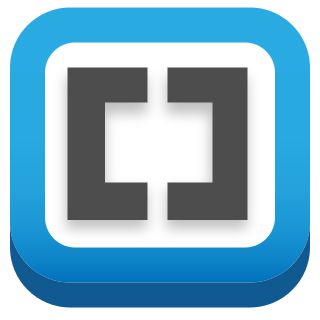
zlib is a software library used for data compression as well as a data format. zlib was written by Jean-loup Gailly and Mark Adler and is an abstraction of the DEFLATE compression algorithm used in their gzip file compression program. zlib is also a crucial component of many software platforms, including Linux, macOS, and iOS. It has also been used in gaming consoles such as the PlayStation 4, PlayStation 3, Wii U, Wii, Xbox One and Xbox 360.
In computing, tar is a computer software utility for collecting many files into one archive file, often referred to as a tarball, for distribution or backup purposes. The name is derived from "tape archive", as it was originally developed to write data to sequential I/O devices with no file system of their own, such as devices that use magnetic tape. The archive data sets created by tar contain various file system parameters, such as name, timestamps, ownership, file-access permissions, and directory organization. POSIX abandoned tar in favor of pax, yet tar sees continued widespread use.
RAR is a proprietary archive file format that supports data compression, error correction and file spanning. It was developed in 1993 by Russian software engineer Eugene Roshal and the software is licensed by win.rar GmbH. The name RAR stands for Roshal Archive.
Delta encoding is a way of storing or transmitting data in the form of differences (deltas) between sequential data rather than complete files; more generally this is known as data differencing. Delta encoding is sometimes called delta compression, particularly where archival histories of changes are required.
Cabinet is an archive-file format for Microsoft Windows that supports lossless data compression and embedded digital certificates used for maintaining archive integrity. Cabinet files have .cab filename extensions and are recognized by their first four bytes MSCF. Cabinet files were known originally as Diamond files.

7-Zip is a free and open-source file archiver, a utility used to place groups of files within compressed containers known as "archives". It is developed by Igor Pavlov and was first released in 1999. 7-Zip has its own archive format called 7z, but can read and write several others.
The following tables compare general and technical information for a number of file archivers. Please see the individual products' articles for further information. They are neither all-inclusive nor are some entries necessarily up to date. Unless otherwise specified in the footnotes section, comparisons are based on the stable versions—without add-ons, extensions or external programs.
Squashfs is a compressed read-only file system for Linux. Squashfs compresses files, inodes and directories, and supports block sizes from 4 KiB up to 1 MiB for greater compression. Several compression algorithms are supported. Squashfs is also the name of free software, licensed under the GPL, for accessing Squashfs filesystems.

PeaZip is a free and open-source file manager and file archiver for Microsoft Windows, ReactOS, Linux, MacOS and BSD by Giorgio Tani. It supports its native PEA archive format and other mainstream formats, with special focus on handling open formats. Version 9.4.0 supported 234 file extensions.

GitHub is a developer platform that allows developers to create, store, manage and share their code. It uses Git software, providing the distributed version control of Git plus access control, bug tracking, software feature requests, task management, continuous integration, and wikis for every project. Headquartered in California, it has been a subsidiary of Microsoft since 2018.
FreeArc is a free and open-source high-performance file archiver developed by Bulat Ziganshin. The project is presumably discontinued, since no information has been released by the developers since 2016 and the official website is down.

OpenRefine is an open-source desktop application for data cleanup and transformation to other formats, an activity commonly known as data wrangling. It is similar to spreadsheet applications, and can handle spreadsheet file formats such as CSV, but it behaves more like a database.

Brackets is a source code editor with a primary focus on web development. Created by Adobe Inc., it is free and open-source software licensed under the MIT License, and is currently maintained on GitHub by open-source developers. It is written in JavaScript, HTML and CSS. Brackets is cross-platform, available for macOS, Windows, and most Linux distributions. The main purpose of Brackets is its live HTML, CSS and JavaScript editing functionality.

Zopfli is a data compression library that performs Deflate, gzip and zlib data encoding. It achieves higher compression ratios than mainstream Deflate and zlib implementations at the cost of being slower. Google first released Zopfli in February 2013 under the terms of Apache License 2.0.
B1 is an open archive file format that supports data compression and archiving. B1 files use the file extension ".b1" or ".B1" and the MIME media type application/x-b1. B1 incorporates the LZMA compression algorithm. B1 archive combines a number of files and folders into one or more volumes, optionally adding compression and encryption. Construction of the B1 archive involves creating a binary stream of records and building volumes of that stream. The B1 archive format supports password-based AES-256 encryption. B1 files are created and opened with its native open-source B1 Pack Tool, as well as B1 Free Archiver utility.

ShareX is a free and open-source screenshot and screencast software for Windows. It is published under the GNU General Public License. The project's source code is hosted on GitHub. It is also available on the Microsoft Store and Steam.
Brotli is a lossless data compression algorithm developed by Google. It uses a combination of the general-purpose LZ77 lossless compression algorithm, Huffman coding and 2nd-order context modelling. Brotli is primarily used by web servers and content delivery networks to compress HTTP content, making internet websites load faster. A successor to gzip, it is supported by all major web browsers and has become increasingly popular, as it provides better compression than gzip.

FBReader is an e-book reader for Linux, Microsoft Windows, Android, and other platforms.








